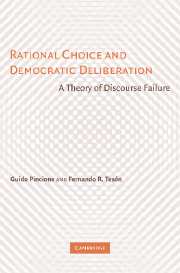Book contents
- Frontmatter
- Contents
- Preface
- Acknowledgments
- 1 Introduction
- 2 The Epistemic Argument for Deliberation
- 3 The Rational Choice Framework
- 4 The Resilience of Discourse Failure
- 5 Symbolism in Political Argument
- 6 Discourse Failure and Political Morality
- 7 Non-Epistemic Defenses of Deliberation
- 8 Deliberation, Consent, and Majority Rule
- 9 Overcoming Discourse Failure: Voluntary Communities
- Index
5 - Symbolism in Political Argument
Published online by Cambridge University Press: 05 May 2010
- Frontmatter
- Contents
- Preface
- Acknowledgments
- 1 Introduction
- 2 The Epistemic Argument for Deliberation
- 3 The Rational Choice Framework
- 4 The Resilience of Discourse Failure
- 5 Symbolism in Political Argument
- 6 Discourse Failure and Political Morality
- 7 Non-Epistemic Defenses of Deliberation
- 8 Deliberation, Consent, and Majority Rule
- 9 Overcoming Discourse Failure: Voluntary Communities
- Index
Summary
Self-Defeatingness as Symbolism
Deliberativists have several strategies available to counter our critique. One is to reinterpret political deliberation as a non-epistemic enterprise. Citizens, they might claim, do things other than seek the truth when they talk to one another. Those speech acts perform very important functions in society. Through deliberation, citizens not only try (clumsily, perhaps) to reach the truth, but, as importantly, they express their commitment to values or principles. Seen in that light, their factual errors are of secondary significance, and hence the charge of discourse failure is less damaging than we have claimed so far. In this and the next chapter we examine two versions of this strategy: the view that deliberation involves symbolic behavior, and the view that apparent factual error can be explained away as a respectable moral position, respectively.
We begin our analysis of symbolism in politics by examining an odd and frequent case. Many people seem insensitive to the fact that the public policies they support in their political deliberation might frustrate the values in the name of which they support those policies. For example, many people support minimum wage laws by invoking the plight of the poor while simultaneously believing that those laws may well hurt the poor. Some writers have argued that only a nonstandard, symbolic model of rationality can vindicate this puzzling behavior as rational. On their view, many people support minimum wage laws to symbolize or express concern for the poor.
- Type
- Chapter
- Information
- Rational Choice and Democratic DeliberationA Theory of Discourse Failure, pp. 123 - 141Publisher: Cambridge University PressPrint publication year: 2006



